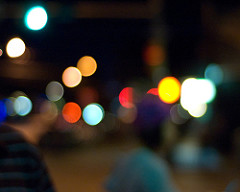By JON THOMPSON
“as the camera moves
through the streets of the Mexican border town
the plan was to feature
a succession of different and contrasting
Latin American musical numbers—
the effect, that is, of
our passing one cabaret orchestra after another. In
honky-tonk districts on the border,
loudspeakers are over
the entrance of every joint, large or small,
each blasting out its own tune
by way of a ‘come on’ or ‘pitch’
for the tourists. The fact that the streets are
invariably loud with this music
was planned as a basic device
throughout the entire picture. The
special use of contrasting mambo-type rhythm numbers with rock’n’roll
should be developed . . . also
either the shot itself,
or its placing,
should have
a bewildering effect:
one just doesn’t know
what’s happening . . . ”
Note: The poem’s language has been fashioned out of Orson Welles’s December 5, 1957, lengthy memo to Universal Studios. The preview version that Orson Welles saw of his film occasioned a fifty-page passionate objection to the studio’s butchered version of it.
Jon Thompson edits Free Verse: A Journal of Contemporary Poetry & Poetics and the single-author poetry series Free Verse Editions.
[Purchase your copy of Issue 05 here]




